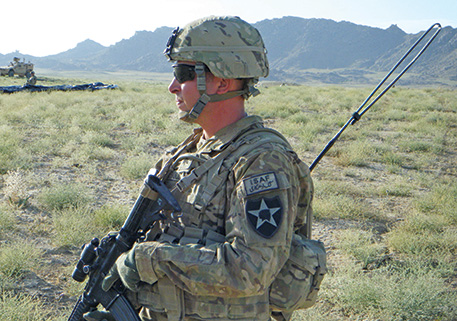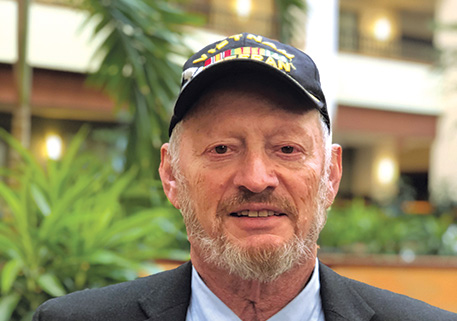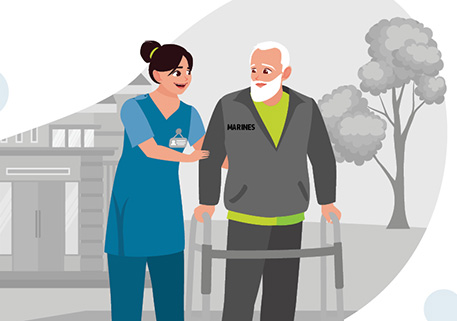New legislation would expand benefits to all eras
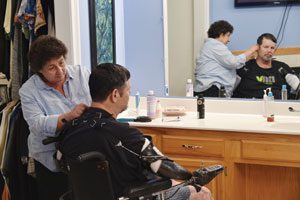
One of DAV’s most prominent legislative priorities received renewed life on Capitol Hill this spring with the introduction of new legislation that would expand caregiver benefits to veterans of all eras if signed into law.
In March, Sens. Patty Murray and Susan Collins and Rep. Jim Langevin introduced the Military and Veteran Caregiver Services Improvement Act in the 115th Congress through companion bills H.R. 1472 and S. 591 in the House and Senate, respectively. Reps. Elizabeth Esty and Ryan Costello also introduced H.R. 1802—the CARE for All Veterans Act.
Currently, the Caregivers and Veterans Omnibus Health Services Act of 2010 extends caregiver support services to family caregivers of veterans who were injured or became severely ill in military service on or after Sept. 11, 2001. The newly proposed legislation would extend those same services—such as caregiver education and training, respite care, mental health services and a monthly stipend—to those injured before 9/11.
“Whether you have a spinal cord injury from Vietnam or a spinal cord injury from Iraq, you still have that injury,” said Pat Dempsey, wife and caregiver of Raymond Dempsey, a DAV past national commander who suffered a spinal cord injury while serving in the Air Force during Vietnam. “And no matter what, you still need quality care.”
Dempsey also noted that the primary care physicians of older veterans are beginning to retire, which can create gaps in care. She argued that family caregivers are best at filling those voids, since they are often with their veterans 24/7 and fully understand their needs.
Studies show caregivers improve veteran patients’ health, reduce hospital readmissions and delay or prevent institutionalization, all of which also decrease overall health care costs and improve quality of life for veterans. However, by serving in this role, caregivers often make personal sacrifices in terms of their own health and well-being, and many caregivers of severely disabled veterans are also aging, which diminishes their ability to continue in their role.
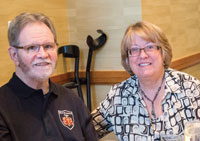

“I’m not getting any younger,” explained Dempsey, “and sometimes I feel like I can’t be doing the heavy lifting or any of the things that came easier 10 years ago.”
“It doesn’t get easier with age,” echoed Yvonne Riley, the wife and caregiver of National Commander Dave Riley, a quadruple amputee. “And having those benefits and being able to have someone come in every once in a while to help take care of our veterans would help these families tremendously.”
A study from the National Alliance for Caregiving found the vast majority of disabled veterans’ caregivers reported increased stress or anxiety and sleep deprivation. The report also shows declines in caregivers’ healthy behaviors—such as exercising, eating healthfully and keeping their own medical appointments. Over half of the caregivers in the study had to cut back their own work hours, and almost half stopped working altogether or took early retirement, resulting in financial hardship.
Still, there are detractors of caregiver expansion legislation who argue that enacting it would cost the government more money than the current program. But that argument is based in ideology rather than the actual numbers.
According to a VA report to Congress, the average yearly caregiver cost per veteran in the current program is $36,770, which is far less than the estimated $332,756 spent to care for a veteran in a VA nursing home, the $88,571 spent to care for a veteran in a community nursing home, or the $45,085 it costs to house a veteran in a State Veterans Home.
“Is it better to spend hundreds of thousands of dollars to put a veteran in a nursing home where they’re sitting there with no quality of life?” Dempsey asked. “Or is it better to have them at home where they have a better quality of life surrounded by loved ones and treated with dignity, at less cost?”
“Ultimately, when fully implemented, the newly proposed pieces of legislation would improve the lives of tens of thousands of veteran families and will save the federal government a significant amount of resources that otherwise would need to be spent to provide institutional solutions to these veterans’ health challenges and health maintenance,” said National Legislative Director Joy Ilem. “These bills are both beneficial to these families and provide taxpayer-friendly options. We need our members to write their elected officials to urge co-sponsorship and support of their passage.”
Learn more online
For more information on DAV’s efforts to extend caregiver support to veterans of all eras, visit www.dav.org/caregiver.




